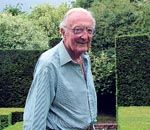Interview: Lord Carrington
Eluned Price talks to the longest-serving member of the House of Lords, was Secretary-General of NATO and Christie's International


It was June 14, 2007, the 25th anniversary of the very day Argentina surrendered to Britain in the Falklands, and Lord Carrington was at home in Buckinghamshire, balking at discussing the last honourable resignation of a British Ministerhis. 'Oh, it's so boring.' Brave, yes. Honest and decent, yes. But not boring.
The outrage and humiliation that Britain suffered by her unpreparedness for the Argentinian invasion was shared by her Foreign Secretary. He resigned, not out of any sense of personal culpability 'that was Galtieri' but in recognition of ministerial mismanagement.'The intelligence was basically wrong. Intelligence is a difficult business. It's all very well when you can see soldiers moving about on the ground, but you can't see someone's intentions. And that's borne out by Iraq. Isn't it, Edward?' The question is addressed to the long wire-haired dachshund lolling in the crook of his right arm. Edward raises his eyebrows, looks across to me, and rolls his eyes. If a dog could say 'Not another rhetorical question', Edward just did.
Edward is reclining on his back beside Lord Carrington, taking up half the armchair. His companion, a grey-haired, trimmer, female variety, called Hilda, is stretched regally along the sofa, forcing Lady Carrington to sit bolt upright at one end. 'They're all named after Prime Ministers,' she says. 'We've had William, Harold, Clement and Arthur. Now it's Hilda and Edward.'
Lord Carrington held office under six Conservative Prime Ministers from Churchill on. He is the longest-serving member of the House of Lords, was Secretary-General of NATO, chaired GEC and Christie's International, was a V&A trustee, and is Chancellor of Reading University. Still with a raft of commitments both here and abroad, and his 88th birthday behind him, he claims to spend his time 'grumbling and gardening. I don't sit about much'.
With that, we are off for a tour of the six acres of garden the Carringtons made out of two fields and a farmyard. Edward follows sedately with not a trace of a sailor's jig. Hilda follows her own course. 'Hilda,' commands Lord Carrington, summoning her from her self-imposed duties of snuffling in the bushes. This is, after all, the man who caused Mrs Thatcher to pause briefly in a meeting with a foreign dignitary by passing her a note: 'The poor chap's come 600 miles. Do let him say something.'
The garden is imbued with tranquillity and surprise, due, he says, to his wife's planting 'and our helper Robert Adam's shaping'. He is too modest to mention his own contribution. That quality pervades his memoirs, Reflect on Things Past, to the extent of almost stifling his wit. But his memoirs accurately reflect his political underpinnings: his inherited Whig liberalism, and the British virtues of compromise and reasonableness, a combination that is inherently incapable of feeling more vicious passions.
Russia's resurgence, he says, is 'quite worrying but explicable'. Of the ultimate authority for Litvinenko's murder, he shrugs: 'Everything in Russia is wrapped in mystery. Who knows?' He is nasty about no one in his memoirs: 'The people I really disliked I never mentioned so when they looked themselves up, they'd be outraged they weren't there.' He deprecates the comparative loss of friendship between political opponents: 'Most of them have never had a job outside politics they're less rounded.'
Sign up for the Country Life Newsletter
Exquisite houses, the beauty of Nature, and how to get the most from your life, straight to your inbox.
Discussing more rounded figures of the past, we come to Macmillan. Lord Carrington tells the story of how someone once admonished him for deriding an American senator who wept at the public confrontation of his wife's alcoholism. He reproved Macmillan, saying: 'How would you like it if some-one yelled out "Lady Dorothy is an old drunk?" ' He responded: 'I'd shout back: "You should have seen her mother!" ' Lord Carrington wipes his eyes with mirth at the recollection. 'He was a wonderful man, Mac-millan, a real card. 'Well, Lord Carrington is quite a card himself.
Country Life is unlike any other magazine: the only glossy weekly on the newsstand and the only magazine that has been guest-edited by HRH The King not once, but twice. It is a celebration of modern rural life and all its diverse joys and pleasures — that was first published in Queen Victoria's Diamond Jubilee year. Our eclectic mixture of witty and informative content — from the most up-to-date property news and commentary and a coveted glimpse inside some of the UK's best houses and gardens, to gardening, the arts and interior design, written by experts in their field — still cannot be found in print or online, anywhere else.
-
 A well-connected rural playground with 23 acres on the edge of the South Downs National Park
A well-connected rural playground with 23 acres on the edge of the South Downs National ParkOld House Farm is an impressive family home with a wealth of amenities that would inspire any rural passion.
By Arabella Youens Published
-
 The UK gets its first ‘European stork village’ — and it's in West Sussex
The UK gets its first ‘European stork village’ — and it's in West SussexAlthough the mortality rate among white storks can be up to 90%, the future looks rosy for breeding pairs in southern England.
By Rosie Paterson Published
